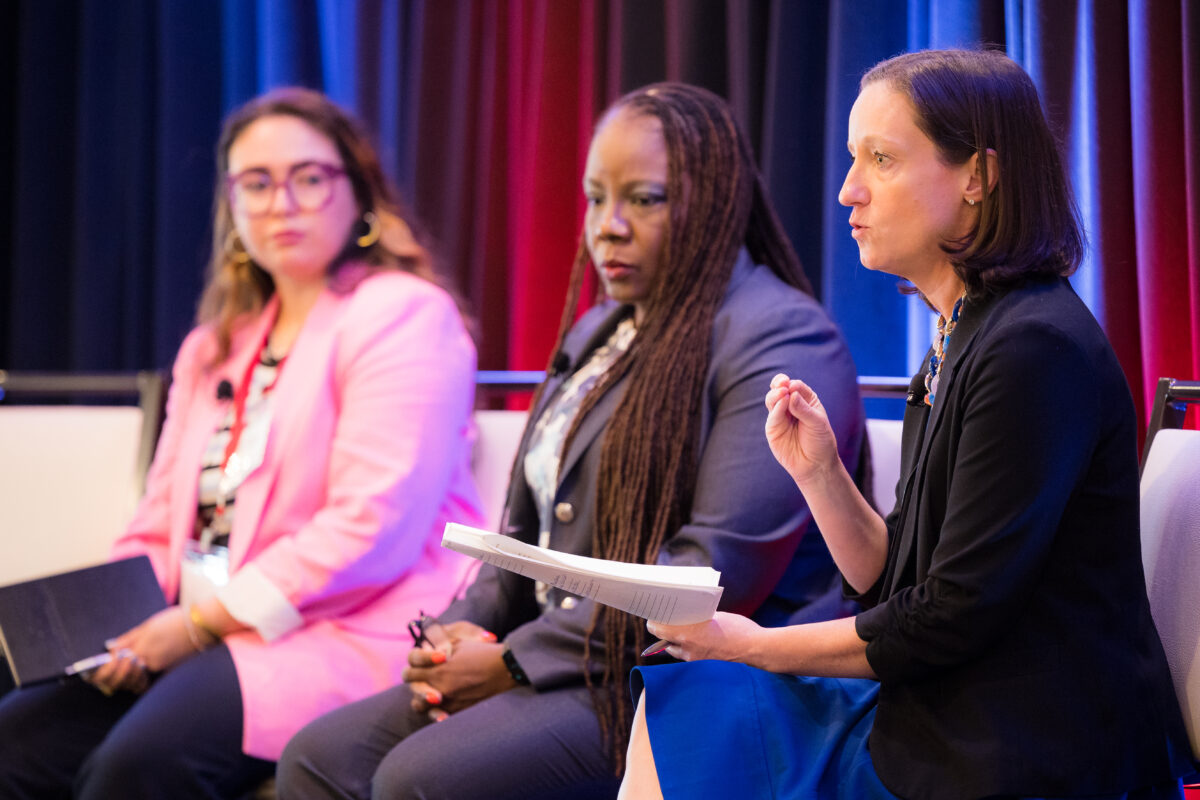Pushing for Transformative Policy Improvements that Deliver Equitable Value for All Students
Published Nov 30, 2023
Earlier this spring, IHEP reached an important milestone: 30 years of developing research to address the nation’s most pressing higher education challenges and promoting college access and success for all students. Our 30-year milestone was an opportunity to refine our purpose and focus on our North Star goal of building a more equitable and just society through higher education. Today, we take the next step in defining the policy priorities that will guide our research and advocacy toward this new organizational vision. A college credential is the best path to long-term career success and a financially secure, fulfilling life. But increasing costs and a lack of access to affordable, high-quality credentials make the need for federal policy reform more critical than ever.
We adopted our first set of policy priorities in 2018 and organized our research, advocacy, and field engagement around these areas: Data & Transparency, Affordability & Need-Based Aid, Access & Success, and Barriers in Justice & Education. Since 2018, we’ve notched several policy wins and made measurable progress for students.
We’ve consistently led the field in advocating for higher quality postsecondary data. We cultivated bipartisan and bicameral support for a comprehensive legislative solution – the College Transparency Act (CTA) – to implement a privacy-protected student-level data network. Alongside our ongoing CTA advocacy, we’re advancing improvements to existing federal data collections and tools to enhance transparency including the Integrated Postsecondary Education Data System (IPEDS), the College Scorecard, and the U.S. Department of Education’s sample studies.
We’ve also advocated for need-based financial aid investments and, alongside fellow advocates, pushed lawmakers to increase the maximum Pell Grant award. We supported bipartisan coalitions to successfully reinstate Pell Grant access for students who are incarcerated. We’ve also worked in partnership with other organizations to spur the launch of and increased investment in Postsecondary Student Support Grants to help institutions scale evidence-based completion strategies.
This progress reflects the talent and commitment of IHEP staff and alumni, as well as researchers, advocates and practitioners who inform and strengthen our work. For example, the foundational insights we developed with the Postsecondary Value Commission, and the resulting Postsecondary Value Framework, unite our newly refined policy priorities.
As we embark on the next stages of our research, advocacy and field engagement, our policy priorities will include:
 Data & Transparency: As leaders of the Postsecondary Data Collaborative, we galvanize the field to advocate for data use at the federal, state and institution levels to improve equitable college access and success and enhance transparency. We are committed to strengthening the availability, quality, and usability of data so students, policymakers and institutions can access the data needed to make informed, evidence-based decisions. We will continue our CTA advocacy.
Data & Transparency: As leaders of the Postsecondary Data Collaborative, we galvanize the field to advocate for data use at the federal, state and institution levels to improve equitable college access and success and enhance transparency. We are committed to strengthening the availability, quality, and usability of data so students, policymakers and institutions can access the data needed to make informed, evidence-based decisions. We will continue our CTA advocacy.
 Equitable College Admissions: Years of inequitable admissions policies have left Black, Latinx, and American Indian and Alaska Native students underrepresented at the nation’s selective institutions, and the U.S. Supreme Court decisions make reversing those trends both more difficult and more critical than ever. Institutions must now reconsider how admissions and recruitment practices can increase diversity and equity in new ways. Research-driven policy solutions can improve institutional practices and open the door of opportunity for students historically underrepresented in postsecondary education. We will build and maintain field support for the positive impacts of a diverse campus to encourage institutions to implement strategies that will increase racial and socioeconomic diversity.
Equitable College Admissions: Years of inequitable admissions policies have left Black, Latinx, and American Indian and Alaska Native students underrepresented at the nation’s selective institutions, and the U.S. Supreme Court decisions make reversing those trends both more difficult and more critical than ever. Institutions must now reconsider how admissions and recruitment practices can increase diversity and equity in new ways. Research-driven policy solutions can improve institutional practices and open the door of opportunity for students historically underrepresented in postsecondary education. We will build and maintain field support for the positive impacts of a diverse campus to encourage institutions to implement strategies that will increase racial and socioeconomic diversity.
 Need-Based Aid: Need-based financial aid makes college possible for millions of students but has not kept pace with rising college costs. We focus squarely on enhancing supports for students living with low and moderate incomes, including through Pell Grants, and funding to support non-tuition costs that include basic needs such as food and housing.
Need-Based Aid: Need-based financial aid makes college possible for millions of students but has not kept pace with rising college costs. We focus squarely on enhancing supports for students living with low and moderate incomes, including through Pell Grants, and funding to support non-tuition costs that include basic needs such as food and housing.

Evidence-Based Completion: Completion is a fundamental lever in increasing postsecondary value for students. Students are significantly more likely to capture the benefits of their college experience when they earn a degree or credential. Policies and practices that have strong evidence-based foundations can increase the chances that students will graduate. These are particularly important when the policies and practices increase completion rates for students historically marginalized on the basis of race or ethnicity and students from low-income backgrounds.
 Strong Outcomes for All Students: All institutions and programs should deliver value to students. Drawing from our Postsecondary Value Framework, we will evaluate novel approaches to assess the economic returns students receive for their postsecondary investment, consider impact with equity in mind, and cultivate support for comprehensive reform that incentivizes and supports improvement, especially among programs that persistently deliver a low return on investment.
Strong Outcomes for All Students: All institutions and programs should deliver value to students. Drawing from our Postsecondary Value Framework, we will evaluate novel approaches to assess the economic returns students receive for their postsecondary investment, consider impact with equity in mind, and cultivate support for comprehensive reform that incentivizes and supports improvement, especially among programs that persistently deliver a low return on investment.
These priorities reflect the continuum of the student experience—from college entry to completion and beyond. Students need access to a college where they can pursue their goals, receive the financial aid that makes college more affordable, and have the right supports in place to earn a credential that will prepare them for success in the workforce. Researchers, advocates and policymakers also need high-quality data every step of the way to inform policies and practices that help more students achieve a financially secure and fulfilling life.
IHEP will build on our progress to push for bigger, bolder and more transformative change to meet the needs of students today. We will leverage our new policy priorities to particularly advance equitable outcomes and generational impact for communities historically marginalized on the basis of race, ethnicity, or income, including Black, Latinx, American Indian and Alaska Native, Asian American, Native Hawaiian, and Pacific Islander students, and urban, rural and suburban students living with low and moderate incomes. That kind of change will require steadfast commitment, laser-focused attention, and extensive partnerships and collaboration.
We look forward to partnering with the higher education community to ensure that policy drives the transformative promise of higher education for generations to come.


